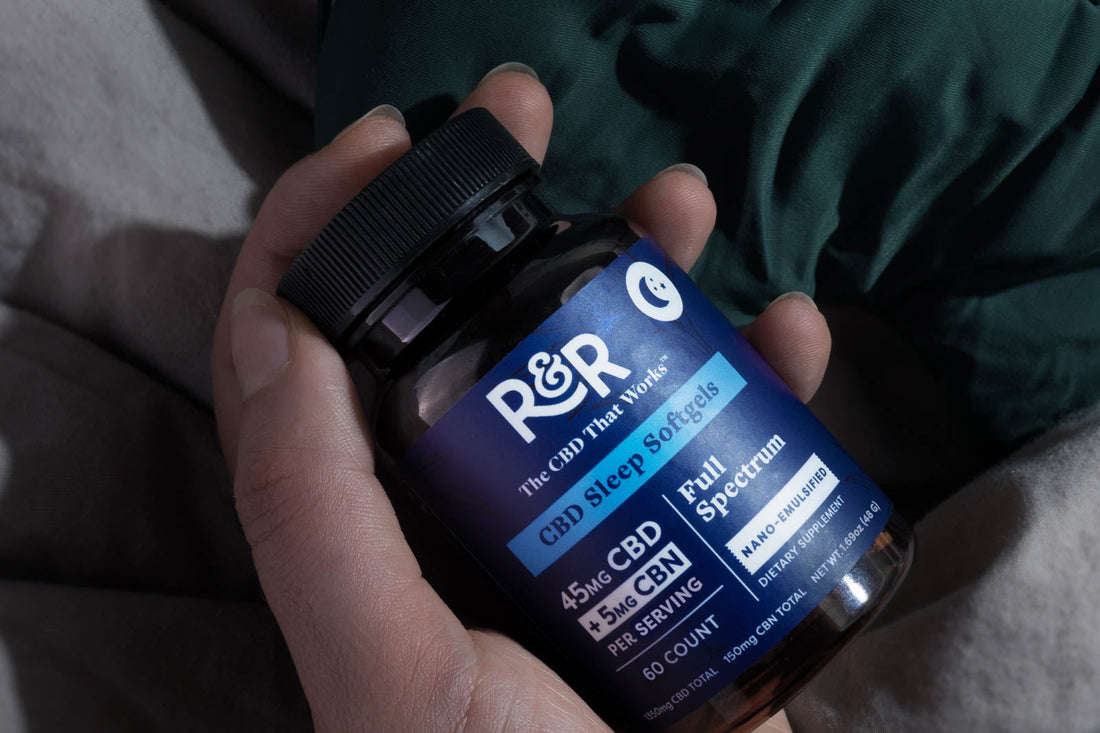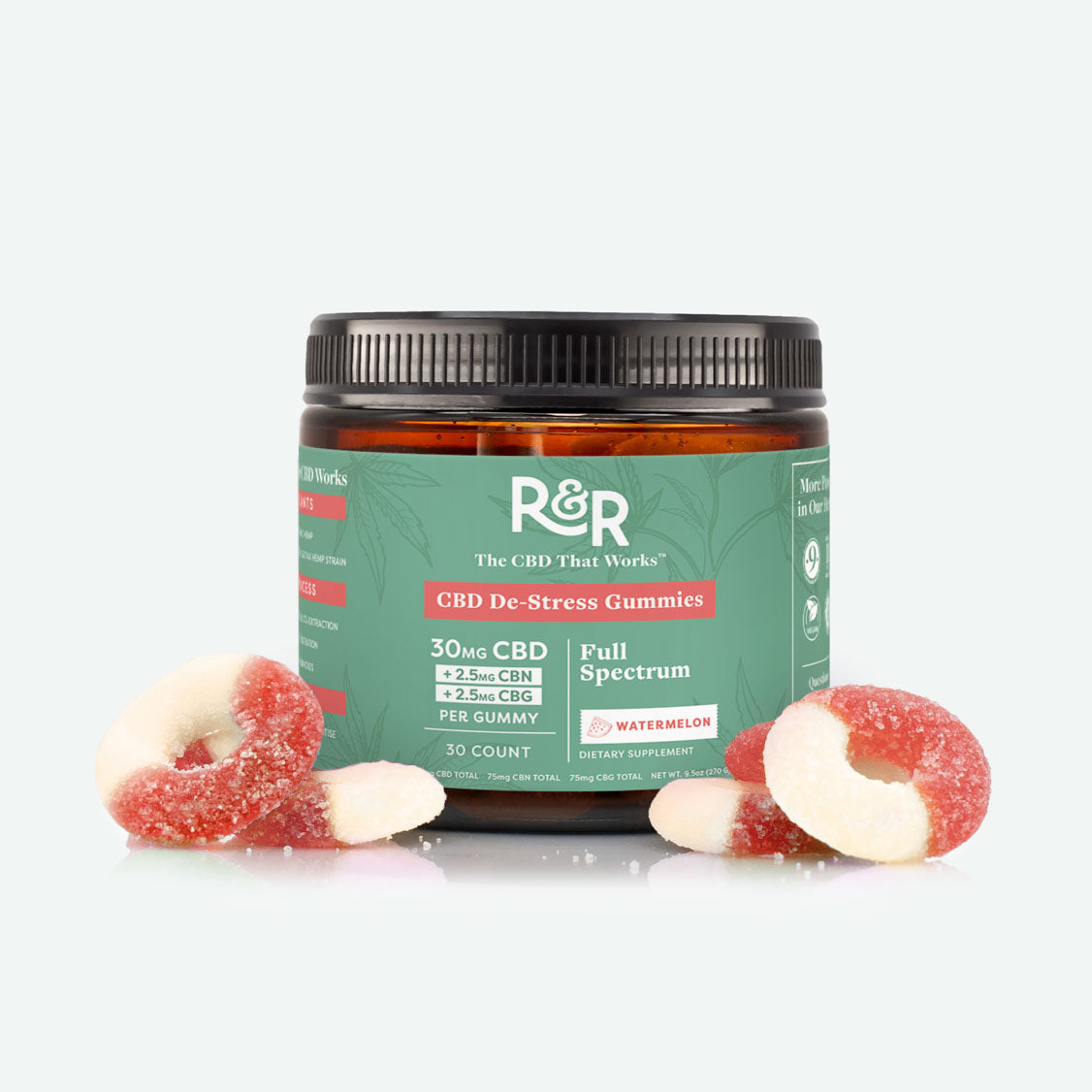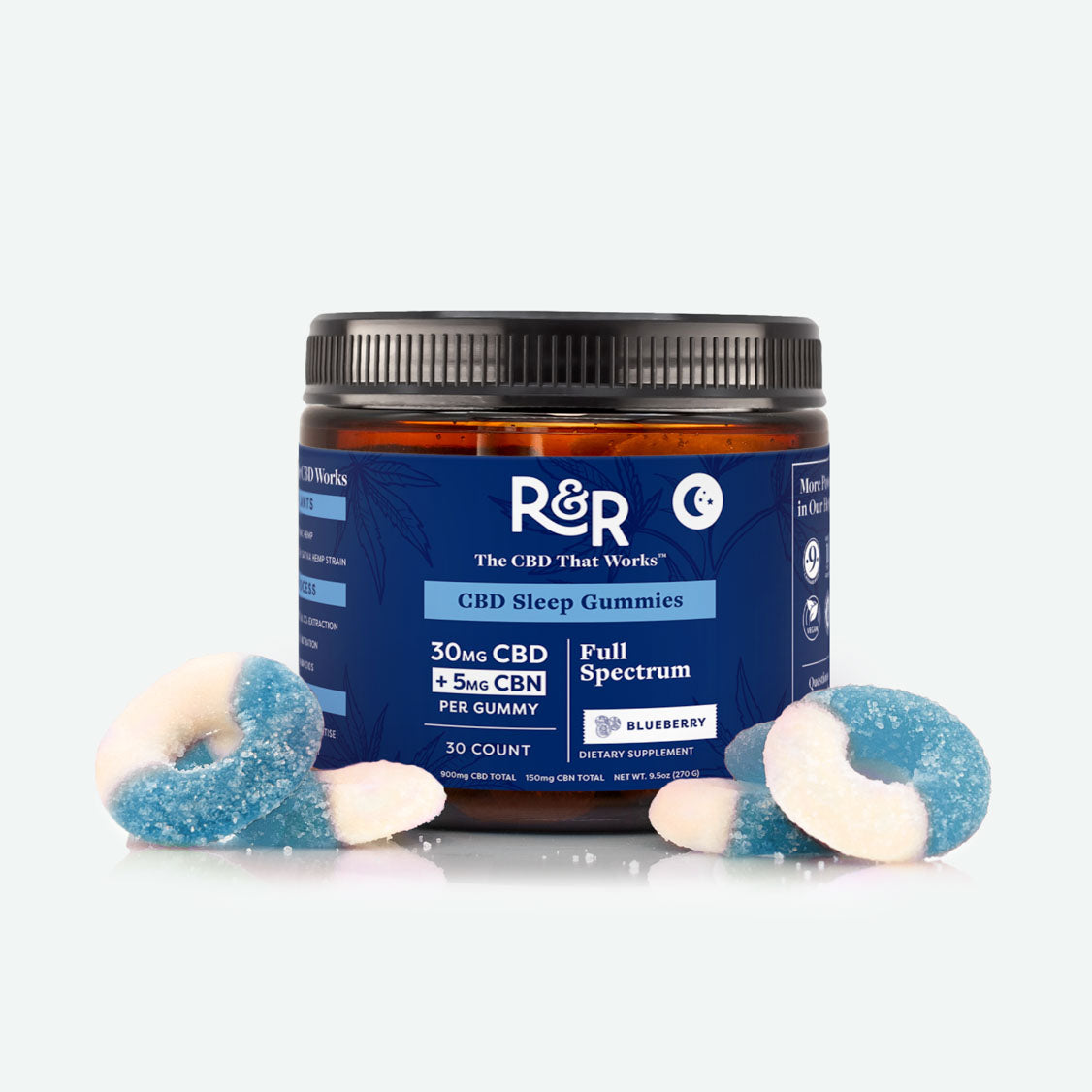Although you may be familiar with CBD and THC, the two most well-known cannabinoids, as potential sleep aids, other cannabinoids may also help you get a good night’s sleep.
A cannabinoid that's been gaining attention lately for its potential sleep-promoting properties is CBN. This compound forms when THC degrades over time. While research on CBN is limited, many cannabis users report that it has sedative effects that may help with sleep
So, how does CBN affect REM sleep, an important phase of the sleep cycle? Is it effective in helping people get better rest?
Key Takeaways
- CBN offers mild sedative effects, which could help you fall asleep more easily.
- Studies suggest CBN may promote more restorative sleep phases, contributing to a more rejuvenating night’s sleep.
- CBN can be combined with other cannabinoids like THC or CBD to enhance its sleep-promoting properties.
What Is CBN?
CBN is a non-intoxicating cannabinoid created when THC, the main psychoactive compound in cannabis, breaks down due to exposure to air, light, or heat. As cannabis ages, the THC slowly converts to CBN.
Though only present in trace amounts in fresh cannabis, CBN is more abundant in older, improperly stored cannabis. This is the reason some users seek out older cannabis, believing it is more sedating.
CBN certainly has great potential as a sleep aid, but how does it differ from THC and CBD?
How CBN Differs from CBD and THC
Although CBN, CBD, and THC are all cannabis cannabinoids, they have distinct differences in their effects and how they interact with the body's endocannabinoid system (ECS).
THC
THC is the primary psychoactive compound in cannabis, responsible for the "high.” It binds directly to the CB1 receptors in the brain, generally producing euphoria, altered perception, and other mind-altering effects.
Although most people generally use THC for its “high-inducing” effect, it also has a variety of potential therapeutic benefits. However, the biggest notable difference is THC’s much greater psychoactive potential compared to CBN.
CBD
CBD, on the other hand, is non-intoxicating and does not directly bind to CB1 receptors, which explains why it doesn’t produce a high.
Instead, it indirectly modulates the ECS, mediating the effects of other cannabinoids and influencing various physiological processes.
CBD’s non-psychoactivity may be one of its strongest selling points, but it also demonstrates potent anti-inflammatory, anxiolytic (anxiety-relieving), and pain-relieving properties.
If you’d like to experience CBD's potential benefits, these R&R CBD Multifunctional CBD Gummies, featuring 60mg of CBD per serving, are a great starting point. They also come in a variety of delectable fruity flavors!
CBN
CBN is often described as a middle ground between THC and CBD. Like THC, it can bind directly to CB1 receptors but with much lower affinity.
This means that while CBN may produce some mild psychoactive effects, they are significantly less potent than those of THC.
However, CBN appears to have an equal or potentially higher binding affinity to CB2 receptors than THC, which may result in increased therapeutic benefits, although more research is required on this front.
CBN’s Potential Effects on the Endocannabinoid System
The ECS is a complex network of receptors, endogenous cannabinoids, and enzymes that play a crucial role in maintaining homeostasis in the body. This system regulates various physiological processes, including sleep, mood, pain, and inflammation.
While THC forms strong bonds with the CB1 receptors, CBN bonds to these receptors but not as strongly, hence its weak psychoactive properties.
CBN has a higher affinity for CB2 receptors, which are mainly located in the immune system and peripheral tissues. This suggests it may have immunomodulatory and anti-inflammatory effects.
Some studies also indicate that CBN may weakly stimulate the TRPV2 receptors, which regulate pain perception and inflammation. This could explain CBN's potential analgesic and anti-inflammatory properties and why it may help with sleep, pain, and inflammation.
The Science Behind CBN and Sleep: Studies and Research
While research suggests that CBN may have sleep-promoting effects, the body of evidence is limited and often mixed. Here’s what the current state of research on CBN and sleep looks like.
Clinical Research on CBN Alone
Recent studies have examined the effect of CBN on sleep and the impact of combining CBN and CBD on sleep.
One such study found that 20mg of CBN may improve certain aspects of sleep, particularly by reducing nighttime awakenings and overall sleep disturbances.
In this study, CBN did not impact sleep onset latency (how long it takes to fall asleep), wake-after-sleep onset (WASO), or daytime fatigue. Moreover, combining CBD with CBN did not enhance these effects, indicating that CBN alone was primarily responsible for the observed benefits.
Indeed, this is one of the modern studies supporting CBN’s sleep benefits and the basis for our CBD De-Stress Gummies. These Gummies contain a mix of CBN, CBG, and CBD, all of which may have sleep-promoting properties. They also have a great watermelon flavor!*
Studies on CBN Combined with THC
Researchers have also investigated the effects of CBN + THC on sleep. For instance, a 1975 study in Pharmacology found that a combination of THC and CBN produced greater sedative effects than either cannabinoid alone.
However, it's important to note that this study used a small sample size of just five male volunteers, and the sedative effects were only observed when CBN was combined with THC. No significant effects on sleep were found when CBN was administered alone.
Some promising studies on CBN’s sleep-promoting properties have also been performed on animals. Here’s what the researchers found.
Preclinical Animal Studies on CBN and Sleep
A study in General Pharmacology found that CBN prolonged sleep time in mice, suggesting potential sedative properties. However, this was only when the mice were given CBN with another sedative.
However, owing to physiological differences, the outcomes of animal studies don't always translate directly to humans. As such, more research is needed to validate these findings.
Overall, existing research on CBN and sleep is limited. The few studies that exist often examine CBN in combination with other cannabinoids, making it difficult to isolate its specific effects. Most studies are also dated, with small sample sizes and varying methodologies.
Therefore, more high-quality human trials are needed to understand how CBN affects sleep architecture and REM sleep.
How Might CBN Affect REM Sleep?
REM sleep, characterized by rapid eye movements and vivid dreams, is a crucial stage in the sleep cycle. During REM sleep, brain activity increases, and the body experiences temporary paralysis to prevent physical movement during dreams.
Interestingly, THC suppresses REM sleep, leading to reduced dreaming and altered sleep architecture. CBN, on the other hand, may very well have the opposite effect.
Although this study may not relate to REM sleep specifically, it indicates that those who took 50mg of CBN showed significant sleep improvements compared to the placebo group.
This finding is supported by user reports that CBN promotes deeper, more restful sleep with fewer disturbances. Given that REM sleep is the final stage in the sleep cycle, it makes sense that by shortening the earlier sleep stages, CBN may increase the duration of slow-wave sleep (the most restorative stage).
Potential Mechanisms of CBN on Sleep Architecture
CBN's effects on sleep may be related to its interaction with the ECS and specific neurotransmitters involved in sleep regulation. As a weak stimulator of CB1 receptors, CBN could positively influence the sleep-wake cycle and alter sleep stages.
Additionally, it has been shown to have sedative properties, which could explain its potential sleep-promoting effects. However, more research is needed to fully understand the mechanisms behind CBN's impact on sleep architecture and REM sleep in humans.
Comparing CBN to Other Sleep Aids
How does CBN compare to other popular options like melatonin, valerian root, or prescription sleep medications?
Melatonin
Unlike melatonin, a hormone that helps regulate the sleep-wake cycle, CBN works through the ECS. While melatonin is effective for some people, others find CBN more suitable, especially if they're looking for a non-hormonal sleep aid.
That said, a study comparing CBN and melatonin showed “no significant difference in improvements in sleep quality” between 4 treatment groups that were given 25 mg, 50 mg, 100 mg of CBN, and 4mg of melatonin, respectively.
Valerian Root
Valerian root is an herbal supplement often used for its sedative properties. Like CBN, it may promote relaxation and improve sleep quality.
Prescription Sleep Medications
Prescription sleep medications, like benzodiazepines and Z-drugs, are potent sedatives that effectively induce sleep.
However, they also come with risks of dependence, withdrawal symptoms, and next-day grogginess. CBN offers a more natural alternative with fewer side effects and typically does not cause hangovers.

CBN Dosage and Timing for Sleep
If you're considering taking CBN for sleep, it's important to understand how to use it effectively. Dosage and timing can significantly impact your experience and the potential benefits you may receive.
Finding the Right CBN Dose
Everyone reacts differently to CBD, so the optimal dose varies from person to person depending on factors such as body weight, metabolism, and individual sensitivity to cannabinoids.
When starting with CBN, it's best to begin with a low dose (5 to 10mg) and gradually increase until you find the amount that works best for you. Some people may find relief with as little as 5mg, while others may require higher doses.
For perspective, this study indicated that 50mg of CBN was effective at promoting sleep, although no comparison was made between different doses. That said, this study found that 20mg of CBN could be beneficial for promoting sleep.
It's also worth noting that CBN products often contain other cannabinoids, like CBD or THC, which can influence the effects. So, pay attention to the concentration of cannabinoids in the product and adjust the dose accordingly.
Remember that how much CBN you take matters, but so does the time you take it.
When to Take CBN for Optimal Results
Timing your CBN intake can affect its potential sleep-promoting properties. Since CBN may have sedative effects, it's generally recommended to take it about an hour before bedtime.
This allows the cannabinoid to be absorbed into your system and start working its magic. Taking CBN too early in the evening may lead to unwanted drowsiness, while taking it too close to bedtime might not give it enough time to take effect and help you get to sleep at your desired time.
Potential Side Effects and Interactions of CBN
While CBN is generally well-tolerated, some people may experience side effects such as drowsiness, dry mouth, or dizziness. Fortunately, these effects are usually mild and temporary, but if you find them bothersome, consider reducing your dosage or discontinuing use.
CBN may interact with certain medications, particularly those metabolized by the liver enzyme CYP450. This includes common prescription drugs, like antibiotics, antidepressants, and blood thinners. If you're on any medications, consult a doctor before adding CBN to your routine to avoid potential adverse interactions.
Pregnant and breastfeeding women should also avoid using CBN due to the lack of safety data in these populations. Similarly, children and adolescents should not use CBN unless under the guidance of a healthcare professional.
If you have a pre-existing medical condition, especially one that affects the liver or cardiovascular system, talk to your doctor before trying CBN.
When introducing any new supplement or cannabinoid into your routine, it's always wise to start with a low dose and monitor your body's response. If you experience any adverse reactions or concerning symptoms, discontinue use and seek medical advice immediately.
Choosing the Best CBN Products for Sleep
When shopping for CBN products to support sleep, you'll find various options, including gummies, tinctures, and vapes. Each delivery method has merits and demerits.
CBN Gummies
CBN gummies and edibles are a convenient, discreet way to consume CBN. They're easy to dose and can provide long-lasting effects. Unlike with vaping, there are no respiratory risks involved with consuming edibles.
For better results, look for gummies and edibles that combine CBN with other sleep-promoting compounds like CBD. Although edibles typically take longer to kick in, they also last longer!
A great option is our CBD Sleep Gummies, which contain 30mg of CBD and 5mg of CBN per Gummy. Each has a delicious blueberry flavor that should lull you to sleep in no time at all.*
Tinctures and Oils
Tinctures and oils are another popular choice for CBN consumption. They allow precise dosing and can be quickly absorbed when taken sublingually.
The effects usually kick in fast and generally last up to four hours or longer. In terms of onset time and the duration of effects, tinctures offer a good middle ground between vaping and edibles.
CBN tinctures may also contain other cannabinoids or terpenes that combine to promote relaxation and improve sleep quality.
Softgels
Softgels are a popular form of CBD (and other supplements) due to their many practical and user-friendly benefits.
Softgels offer a hassle-free, discreet, and consistent way to consume CBD, providing precise dosing, enhanced bioavailability, and convenience. They are ideal for users who prefer simplicity, don’t like the taste of oils, or are looking for a slow, sustained release of active compounds.
Our CBD Sleep Softgels are guaranteed to help you stop tossing and turning so you can enjoy revitalized mornings. Infused with full-spectrum CBD, CBN, and calming adaptogens like L-theanine and Valerian Root, our Softgels work harmoniously and naturally with your body to support deeper sleep.*
CBN Vapes
For those who prefer inhalation, CBN vapes offer fast-acting effects. When inhaled, CBN enters the bloodstream through the lungs, providing rapid relief from sleep disturbances.
You don’t want to cause your lungs any more damage by vaping sub-standard products. That said, vaping is not ideal for those who have concerns about their respiratory health, in which case CBN gummies and edibles are the best choices.
Resources for Cannabinoids and Their Role in Sleep
For those interested in the science behind how cannabinoids improve sleep, understanding their specific effects is crucial. Our article on how CBN impacts sleep discusses whether it causes grogginess and highlights its ability to enhance sleep quality.
If you're curious about the benefits of combining cannabinoids, our guide to CBG vs CBN provides valuable insights into their distinct effects and how they may complement each other for better sleep.
Finally, for a broader view of how to choose the best cannabinoid for sleep, our resource on what cannabinoid is good for sleep can help you identify the right solution for your needs.
These resources offer helpful perspectives for making informed decisions about incorporating cannabinoids into your sleep routine.
Final Thoughts: Is CBN Right for Your Sleep Needs?
While research on CBN is still in its early stages, existing studies suggest that it may have potential as a sleep aid by reducing nighttime awakenings and sleep disturbances.
Various CBN products, such as tinctures, gummies, and vapes, offer flexible ways to explore these benefits.
CBN is a natural, non-intoxicating option for those seeking to improve their sleep quality. So, if you are interested in exploring CBN’s benefits for better sleep, R&R CBD offers a variety of high-quality CBN products.
Our organic, lab-tested formulations provide safe and effective options for individuals looking to enhance their sleep naturally.
Find the right CBN product for sleep at R&R CBD today!
CBN and REM Sleep: FAQs
Does CBN Negatively Impact REM Sleep?
While research on CBN is still limited, there are no definitive studies showing that it disrupts REM sleep. Instead, user reports suggest that it helps improve the deeper stages of sleep, which indirectly benefits REM sleep.
Does CBN Make You Groggy the Next Day?
CBN is generally well-tolerated, and most users don’t report significant grogginess the next day. However, individual responses can vary depending on dosage, personal sensitivity to cannabinoids, and other factors.
Is CBN or CBD Better for Sleep?
CBN and CBD have been shown to offer potential sleep benefits, but they work in different ways. CBN is often associated with sedation and may suit individuals seeking a stronger sleep aid. CBD, on the other hand, is known to reduce anxiety and promote relaxation, which also helps with sleep.
For those who would rather try CBD instead of CBN for sleep, take a look at our CBD products, offering great relief without any intoxicating effects.
Sources Used for This Article:
- NCBI Study on Cannabinoids
- APA PsycNet Article
- NCBI Clinical Research
- OUP Sleep Study
- ScienceDirect on Cannabinol
- Public Health Insights
- Recent Pharmacology Article
- Genetic Study
- Biomedical Research on ScienceDirect
- Journal of Cannabis Research
- NCBI Health Research
- Genomics Study
- Cancer Research Article
- Recent Biomedical Study
- Lumir Lab Cannabinoid Study
- Genetic Findings on NCBI
- NCBI Public Health Article
- PubMed Medical Research
- Pharmacology Study on PubMed
- JStage Chemistry Article
- Recent PubMed Findings
- Sleep Disorder Research on NCBI
- OUP Supplement Study
- ScienceDirect Slow-Wave Sleep
- NIH on Valerian
- NCCIH Valerian Overview
- Sleep Foundation on CBN
- NCBI Biomedical Findings
- NCBI Public Health Study


























